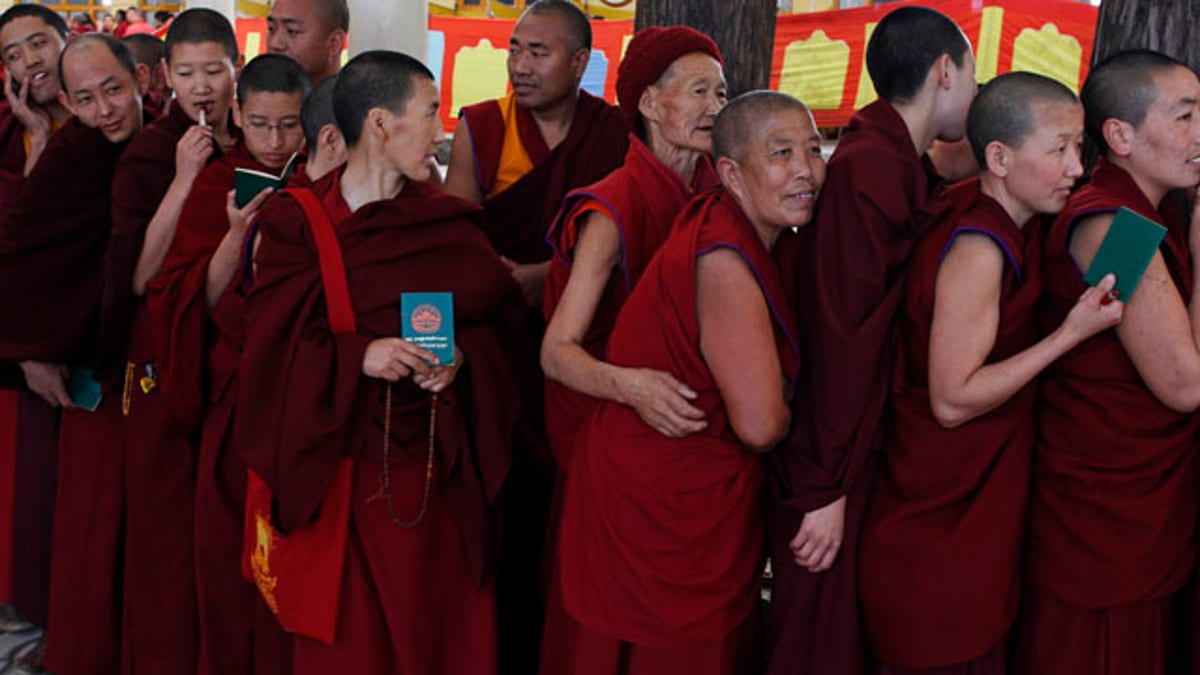
March 20, 2011: Exile Tibetan Buddhist monks and nuns line up with their green books to cast their votes during the final round of voting to choose the next exile Tibetan prime minister and the members of the Tibetan parliament-in-exile in Dharmsala, India. (AP)
DHARMSALA, India -- Tibetans across the world began voting Sunday for a new leader to take up the resistance against Chinese rule over their Himalayan homeland, as the Tibetan parliament-in-exile debated how to handle the Dalai Lama's resignation from politics.
Hundreds of monks in crimson robes joined Tibetan students, housewives and business people and the elderly in lining up in the courtyard of the Tsuglakhang Temple in India's northern city of Dharmsala, where the exiled government is based, to cast their votes in a cheerful and festive atmosphere.
Despite pleas from the Tibetan community in exile that the Dalai Lama stay on as head of government, the Buddhist spiritual leader has been adamant that the elected prime minister should take over.
The shift in power marks a major change for the Tibetan community, which for decades has looked to the Dalai Lama for both spiritual and political guidance against the heavy-handed rule of China's Communist authorities in Tibet.
The parliament-in-exile was discussing constitutional changes Sunday to enact the change and free the 76-year-old Nobel Peace laureate to focus on spiritual matters.
"He has conveyed his decision to give up his political responsibilities firmly," parliament Speaker Penpa Tsering said Saturday, predicting the assembly would honor his wish despite passing a resolution a day earlier asking him to stay.
The Dalai Lama -- who is vilified by China as a political schemer -- has never fully explained his decision to resign, which he announced on the March 10 anniversary of a failed 1959 uprising against Chinese rule over Tibet that sent him into exile.
But he has suggested negotiations with Beijing might be less complicated under another Tibetan figurehead, and he has said that, in the 21st century, the idea that leaders should be elected and representative was correct.
Successive rounds of talks between Chinese officials and representatives of the Buddhist leader have made no apparent progress toward bringing the sides together, as Beijing accuses the Dalai Lama of seeking to separate Tibet from China, despite his claims to be working only for a high degree of autonomy under Chinese rule.
On Sunday, some 85,000 registered Tibetans in exile -- 11,000 of them in Dharmsala -- were choosing the new prime minister among three candidates, as well as some new parliament members, in a daylong election previously scheduled, even if its importance was only boosted this month when the Dalai Lama resigned. Election results will be likely announced April 27.
Front-runner Lobsang Sengey -- a senior fellow at Harvard Law School born and brought up in exile -- said Tibet would now be fighting against China on two fronts.
"On one side we'll have the Dalai Lama, who has historical legitimacy and global popularity," he told The Associated Press. "And on the second, we have a democratic government functioning in exile. We are showing China that, if Tibetans are allowed to choose, they are capable of forming a stable democratic government."
The other candidates are Tenzin Namgyal Tethong, a diplomat also settled in the U.S., and Tashi Wangdi, who was the Dalai Lama's representative in Brussels, New York and New Delhi.
Earlier Sunday, when Sengey walked up to the temple to cast his ballot, the crowd cheered and children jostled to shake his hand and take his photograph. If he wins, he said, he and his family will move to Dharmsala from their U.S. home outside Boston, Massachusetts. Regardless, he would still consider the Dalai Lama his leader.
"All I could hope for is to live up to his expectations and, according to his wishes, see our democracy mature," he said. Though he knew of the Dalai Lama's wish to step down politically, he did not expect it this year. "I felt a strong emotion, like all Tibetans. I was anxious, nervous and curious, and the news was difficult to digest."
The Dalai Lama, who is believed to be in fairly good health, will maintain his position as spiritual leader until his death, when a new Dalai Lama would be found. He has indicated his successor would come from the exile community, and could even be a girl.
The question of succession has become all important within the Tibetan community, for whom the Dalai Lama is a symbol of cultural survival and political resistance.
Beijing insists the reincarnation must be found in China's Tibetan areas, and has made clear that it intends to have the final say -- giving Communist authorities immense power over who is chosen.
Many observers believe there eventually will be rival Dalai Lamas, one appointed by Beijing and one by senior monks loyal to the current Dalai Lama.
